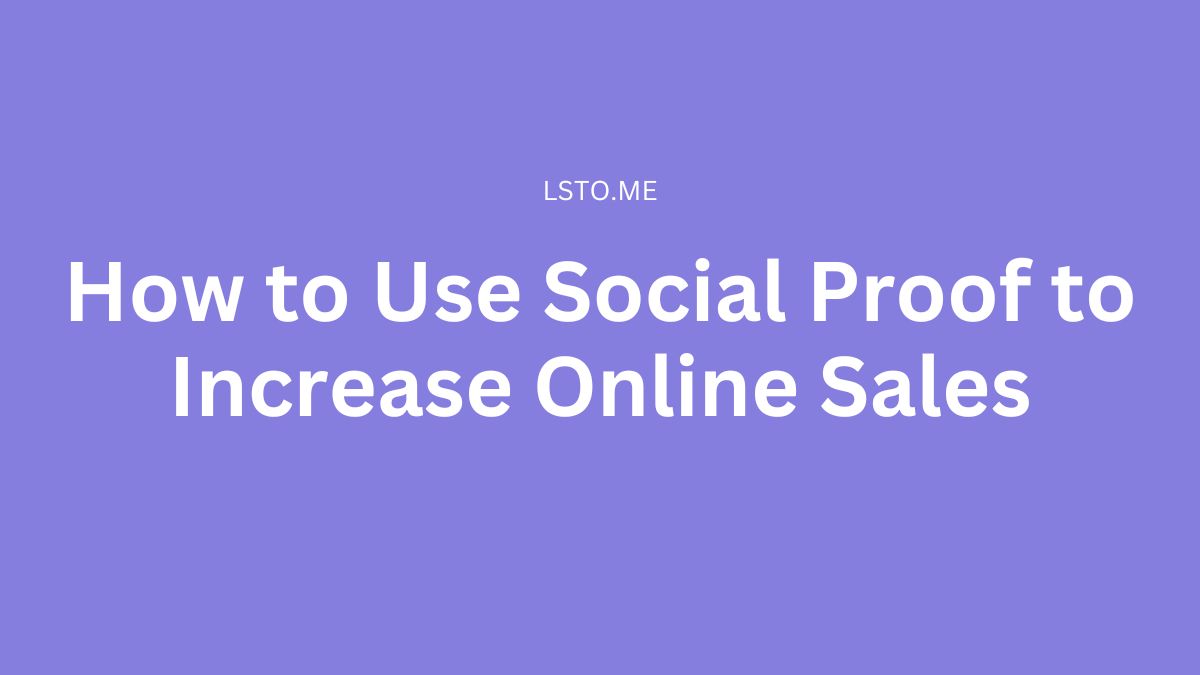
Today’s digital landscape has made social proof powerful. It’s a tool for businesses to boost online sales. By using others’ experiences and opinions, businesses can build trust. They can also encourage engagement and, in the end, drive more sales. In this blog post, we’ll explore the idea of social proof. We’ll cover its forms and ways to use it to boost your online sales.
What is Social Proof?
Social proof is a psychological phenomenon. People mimic the actions of others to copy correct behavior. It’s based on the idea that people will follow the actions of the masses. They do this assuming that these actions are correct.
In online sales, social proof means showing the positive experiences of customers. It includes their feedback. It is to influence the buying choices of potential buyers. It builds trust and credibility. This makes it easier for new customers to believe in your products or services.
Types of Social Proof
There are several types of social proof that businesses can use to increase online sales. Knowing these types will help you decide which are most relevant. They are also the most effective for your business.
1. Customer Reviews and Testimonials
Customer reviews and testimonials are perhaps the most common form of social proof. They show potential buyers the experiences of others. They have bought and used the product.
How to Use:
- Display Reviews on Product Pages: Ensure that each product page features customer reviews and ratings. Highlight positive reviews and address any negative feedback constructively.
- Create Testimonial Videos: Videos can be more engaging than written reviews. Ask satisfied customers to share their experiences on video and feature these on your website and social media.
2. Influencer Endorsements
Influencers have many followers on social media. They can affect what their followers buy. An endorsement from a trusted influencer can serve as powerful social proof.
How to Use:
- Collaborate with Influencers: Identify influencers in your niche and collaborate with them to promote your products. This can include sponsored posts, product reviews, and unboxing videos.
- Leverage Micro-Influencers: Micro-influencers may have smaller followings but often boast highly engaged audiences. Their endorsements can be more authentic and cost-effective.
3. Social Media Mentions
When customers share their good experiences on social media, it shows their followers. It shows your potential customers that they like your products.
How to Use:
- Encourage User-Generated Content: Create campaigns that encourage customers to share their experiences with your products using specific hashtags. Feature this content on your website and social media profiles.
- Showcase Social Media Mentions: Use social media feeds or widgets to display real-time mentions and posts about your brand directly on your website.
4. Case Studies
Case studies provide detailed accounts. They show how your product or service solved specific problems for customers. They are particularly effective for B2B businesses.
How to Use:
- Develop In-Depth Case Studies: Create detailed case studies that highlight the problem, the solution provided by your product, and the results achieved.
- Feature on Website and Marketing Materials: Place case studies prominently on your website and use them in your email marketing campaigns and sales pitches.
5. Certifications and Awards
Certifications and awards from good organizations endorse your product. They show its quality and reliability.
How to Use:
- Display on Website: Highlight any certifications or awards your product has received on your homepage, product pages, and about page.
- Include in Marketing Materials: Mention these accolades in your email marketing, social media posts, and advertising campaigns.
6. Celebrity Endorsements
Celebrities’ support can provide social proof. This is due to fans’ high trust and admiration for them.
How to Use:
- Partnerships with Celebrities: Collaborate with celebrities to endorse your products. This can include social media posts, commercials, and public appearances.
- Use in Advertising Campaigns: Incorporate celebrity endorsements in your advertising campaigns to reach a broader audience.
Practical Ways to Implement Social Proof
Now we’ve explored the types of social proof. Let’s discuss how to use these strategies to raise your online sales.
1. Create a Review Section
You need a review section on your website. Customers can leave feedback there. Make it easy for customers to submit reviews. Ensure the review section is highly visible.
Steps:
- Automate Review Requests: Use email marketing to follow up with customers after purchase, asking them to leave a review.
- Moderate Reviews: Regularly monitor and moderate reviews to ensure they are genuine and constructive.
2. Leverage User-Generated Content
User-generated content (UGC) can be a goldmine of social proof. Encourage your customers to share their product experiences. They can do so with photos, videos, and posts on social media.
Steps:
- Create Hashtag Campaigns: Develop specific hashtags related to your brand and encourage customers to use them when posting about your products.
- Run Contests and Giveaways: Organize contests and giveaways that incentivize customers to create and share content about your products.
3. Highlight Influencer and Celebrity Partnerships
If you have partnerships with influencers or celebrities, show off these endorsements. Put them on your website and marketing channels.
Steps:
- Feature on Homepage: Display influencer and celebrity endorsements prominently on your homepage.
- Create Dedicated Pages: Develop dedicated pages or sections for influencer and celebrity partnerships, including photos, videos, and testimonials.
4. Showcase Certifications and Awards
Show any certifications, awards, or recognitions your product or business has received. This will build trust and credibility.
Steps:
- Add Badges to Product Pages: Place certification badges and award logos on relevant product pages.
- Mention in About Page: Include a section on your about page detailing your certifications and awards.
5. Develop Detailed Case Studies
Case studies are particularly effective for businesses offering complex products or services. Develop detailed case studies and make them accessible to your audience.
Steps:
- Identify Success Stories: Reach out to customers who have had significant success with your product and ask for their participation.
- Create Comprehensive Content: Develop comprehensive case studies that include background information, challenges faced, solutions provided, and results achieved.
6. Encourage Social Media Engagement
Social media is a powerful platform for building social proof. Encourage your customers to engage with your brand on social media and share their experiences.
Steps:
- Engage with Customers: Respond to comments, messages, and mentions on social media to foster a sense of community.
- Share Customer Stories: Regularly share customer stories, testimonials, and user-generated content on your social media profiles.
Conclusion
Social proof is powerful. It can greatly increase your online sales. It does this by building trust and credibility with potential customers. You can use customer reviews. You can also use influencer endorsements and social media mentions. Also, use case studies, certifications, and celebrity endorsements. They allow you to create a story that encourages new customers to buy.
Using social proof needs a proactive approach. You also need a commitment to engaging with your customers. By collecting and showing good feedback, you can create a cycle of trust and sales growth.




